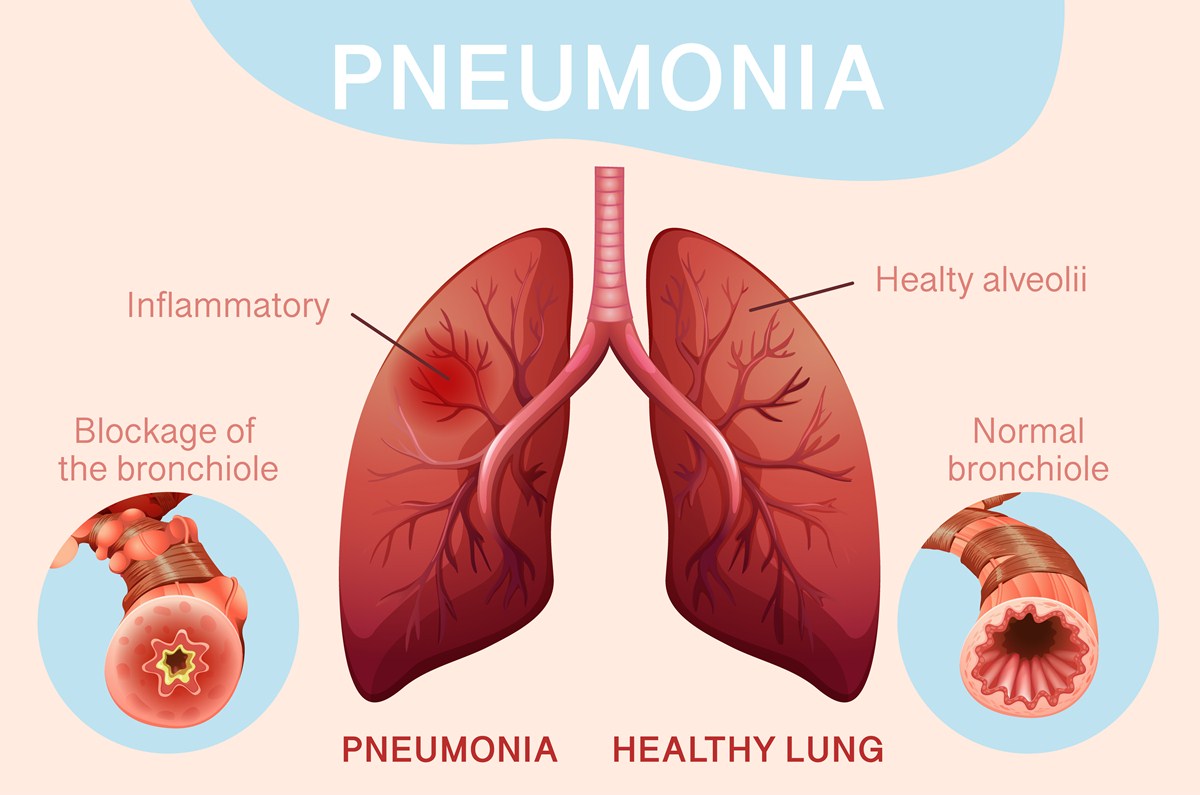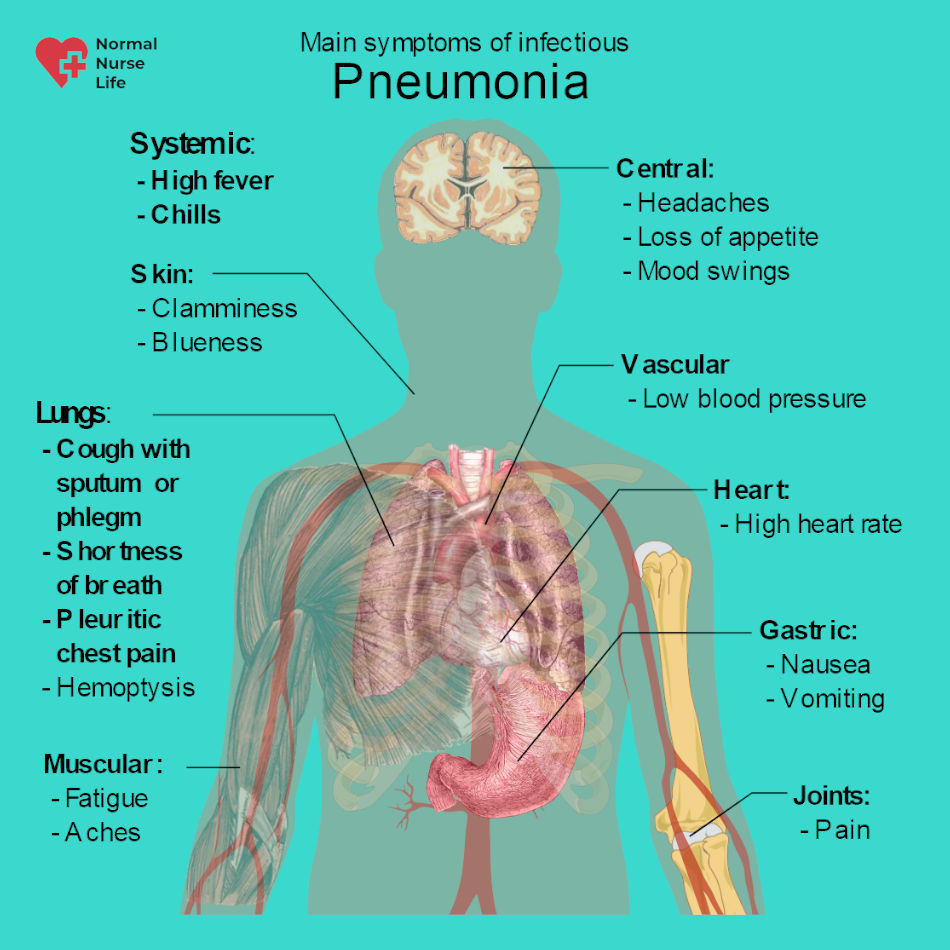
What is pneumonia disease

Pneumonia is typically caused by a virus or bacteria you have existing lung diseases, poor nutrition, difficulty swallowing. Pneumonia is an inflammation of the lungs caused by bacteria or viruses, says Dr. Antonio Arrieta, CHOC's Pediatric Infectious Disease Specialist. Pneumonia is an infection of one or both of the lungs caused by bacteria, viruses, fungi, or chemical irritants. It is a serious infection or inflammation. The signs and symptoms vary according to disease severity. Common symptoms include fever, cough, sputum production (may or may not be present). Pneumococcal disease is caused by bacteria. It can lead to pneumonia, ear infections, and blood infections. It can also inflame the coverings of the brain.
Jul 30, · Pneumonia is an infection that inflames your lungs' air sacs (alveoli). The air sacs may fill up with fluid or pus, causing symptoms such as a cough, fever, chills and trouble breathing. What Are the Symptoms of Pneumonia? Pneumonia symptoms can vary from so mild you barely notice them, to so severe that hospitalization is required. 丁香园、丁香医生整合各权威渠道发布的官方数据,通过疫情地图直观展示. Improving patient care through guidelines, evidence summaries and decision aids that we can all trust, use and share.
What Are the Signs & Symptoms of Pneumonia? · fever · cough · chills · fast breathing · breathing with grunting or wheezing sounds · working hard to breathe · vomiting. Pneumonia is an infection in one or both lungs caused by bacteria, viruses, or fungi. The infection leads to inflammation in the air sacs of the lungs. Pneumonia is an infection of the lungs. It affects the small airways and air sacs in the lungs. Learn about diagnosis and treatment at UVA.
Jan 05, · Pneumonia is an infection of the lungs caused by bacteria, viruses, fungi, or parasites. Read on for more about the risk groups and treatments available. Nov 11, · Pneumonia is the single largest infectious cause of death in children worldwide. Pneumonia killed children under the age of 5 in , accounting for 14% of all deaths of children under five years old but 22% of all deaths in children aged 1 to 5. or in a health facility if the disease is severe -- and can get the antibiotics and. Symptoms depend on the type of infection. The most common type of infection is tracheobronchitis (chest cold), but pneumonia (lung infection) can occur. Common symptoms of a chest cold include: Sore throat; Feeling tired; Fever; Slowly worsening cough that can last for weeks or months; Headache; Common symptoms of pneumonia include: Cough that.
Viruses, bacteria, and fungi can all cause pneumonia. In the United States, common causes of viral pneumonia are influenza, respiratory syncytial virus (RSV). Pneumonia is an infection of one or both of the lungs caused by bacteria, viruses, or fungi. It's a serious infection in which the air sacs fill with pus and.
Symptoms depend on the type of infection. The most common type of infection is tracheobronchitis (chest cold), but pneumonia (lung infection) can occur. Common symptoms of a chest cold include: Sore throat; Feeling tired; Fever; Slowly worsening cough that can last for weeks or months; Headache; Common symptoms of pneumonia include: Cough that. Improving patient care through guidelines, evidence summaries and decision aids that we can all trust, use and share. Aug 16, · If your pneumonia is so severe that you are treated in the hospital, you may be given intravenous fluids and antibiotics, as well as oxygen therapy, and possibly other breathing treatments. Recovering from Pneumonia. It may take time to recover from pneumonia. Some people feel better and are able to return to their normal routines within a week.
Pneumonia is an inflammation of the airspace (alveoli; singular alveolus) in the lung most commonly caused by infections. Bacteria, viruses, or fungi . Adults 65 and older · Children less than 5 years old · People who smoke · Alcoholics · People with lung diseases · People with a recent cold or the flu · People who. Pneumonia · An infection that inflames air sacs, which may fill with fluid, in the lungs · Symptoms include a cough with colored mucus, fever, confusion, trouble. Pneumococcal disease is caused by bacteria called Streptococcus pneumoniae. These bacteria may cause infections of the lung (pneumonia), middle ear (otitis.
Nov 11, · Pneumonia is the single largest infectious cause of death in children worldwide. Pneumonia killed children under the age of 5 in , accounting for 14% of all deaths of children under five years old but 22% of all deaths in children aged 1 to 5. or in a health facility if the disease is severe -- and can get the antibiotics and. Jan 05, · Pneumonia is an infection of the lungs caused by bacteria, viruses, fungi, or parasites. Read on for more about the risk groups and treatments available. Improving patient care through guidelines, evidence summaries and decision aids that we can all trust, use and share.
Pneumonia is an infection of the lungs, caused by bacteria or viruses. · Anyone of any age can be affected, but children under the age of four years are very. Legionella pneumophila. This type of pneumonia sometimes is called Legionnaire's disease, and it has caused serious outbreaks. Outbreaks have been linked to. Adults 65 and older · Children less than 5 years old · People who smoke · Alcoholics · People with lung diseases · People with a recent cold or the flu · People who. Pneumococcal disease is caused by bacteria called Streptococcus pneumoniae. These bacteria may cause infections of the lung (pneumonia), middle ear (otitis. Pneumonia is a lung infection that is usually caused by a virus or bacteria. This makes the air sacs in the lungs fill with fluid (phlegm or mucus).
What is pneumonia disease - Symptoms depend on the type of infection. The most common type of infection is tracheobronchitis (chest cold), but pneumonia (lung infection) can occur. Common symptoms of a chest cold include: Sore throat; Feeling tired; Fever; Slowly worsening cough that can last for weeks or months; Headache; Common symptoms of pneumonia include: Cough that.
What is pneumonia disease - Aug 16, · If your pneumonia is so severe that you are treated in the hospital, you may be given intravenous fluids and antibiotics, as well as oxygen therapy, and possibly other breathing treatments. Recovering from Pneumonia. It may take time to recover from pneumonia. Some people feel better and are able to return to their normal routines within a week.


What necessary words... super, excellent idea
Remarkable idea
It is remarkable, rather amusing opinion
Your phrase, simply charm
I think, that you are mistaken. I suggest it to discuss. Write to me in PM, we will talk.